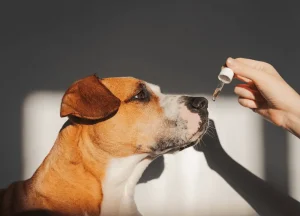Vitamin deficiencies in dogs that can lead to hair loss include lack of vitamins A, E, B-vitamins, and D. Insufficient intake of these vitamins may cause skin issues and alopecia in canines.
Vitamins play a significant role in various bodily functions, including the growth and repair of hair. While genetics and external factors can contribute to coat problems, nutritional deficiencies are a common culprit behind canine alopecia.
Ensuring your pet receives adequate levels of vitamins A, E, B-vitamins, and D is key to preventing hair loss and promoting a glossy, robust fur coat.
Symptoms Of Vitamin Deficiency-related Hair Loss
Vitamin deficiencies can lead to several health issues in dogs, one of which is hair loss. Understanding the symptoms can help pet owners identify the issue early. A dog’s coat is often a reflection of their overall health, and changes in its condition or growth can indicate a deeper health concern, such as a vitamin deficiency.
Identifying Hair Loss Patterns In Dogs
Spotting uneven patches of hair loss on your dog can raise red flags. Hair loss typically appears around the eyes, mouth, and on the legs. Keep an eye out for any bald spots or thinning areas that seem to get bigger or spread. These patterns are often clues pointing to an underlying vitamin deficiency.
Other Clinical Signs Of Nutritional Deficiencies
Beyond hair loss, dogs may show other signs that suggest a lack of essential nutrients. Here are some symptoms pet owners should look out for:
- Brittle or dull coat
- Excessive shedding
- Flaky or itchy skin
- Lethargy or a lack of energy
- Weight loss even if they eat normally
Paying attention to these symptoms can help prevent more severe health issues. A balanced diet rich in essential vitamins and minerals plays a crucial role in maintaining a dog’s coat and overall well-being. It’s essential to consult a veterinarian if you notice any signs of hair loss or other health concerns in your dog.
Multivitamin Premium 10 in 1 Dog Vitamins

Dog Vitamins and Supplements for Skin and Coat

Vitamin A Deficiency
The significance of Vitamin A for dogs is vast, impacting their entire well-being, including hair health. A lack of Vitamin A in a dog’s diet can lead to troublesome symptoms, resulting in dull coats and potential hair loss. Let’s explore how Vitamin A insufficiency affects our furry friends.
Effects On Skin And Coat
Vitamin A plays a critical role in skin cell production. Without it, dogs may suffer from skin issues. Here are the key impacts:
- Dry, flaky skin becomes evident.
- Coat loses its luster, looking dull and lifeless.
- Follicles weaken, leading to hair thinning and loss.
Adequate Vitamin A intake helps maintain a dog’s glossy coat and promotes the regeneration of healthy skin cells.

Other Health Implications
Not only the skin and coat, but Vitamin A deficiency can have wider health effects:
| Health Aspect | Impact of Deficiency |
|---|---|
| Immune System | Weakens defense against diseases |
| Eye Health | Increases risk of vision problems |
| Growth | Stunts growth in puppies |
Ensuring your dog receives an appropriate amount of Vitamin A is essential for preventing these health issues and maintaining overall vitality.
Vitamin E Deficiency
Vitamin E deficiency in dogs can lead to poor coat health and hair loss. Essential for optimal skin and follicle function, sufficient vitamin E intake is vital for maintaining your canine’s lustrous fur.
Vitamin E plays a crucial role in maintaining a dog’s coat and skin health. This vital nutrient acts as an antioxidant, protecting skin cells from oxidative damage.
Ensuring your furry friend receives enough Vitamin E is key to preventing these issues. Let’s explore further how this deficiency impacts a dog’s skin and hair, alongside other symptoms to watch for.

Impact On Skin And Hair Health
- Decreased oil production: Leads to dry, flaky skin
- Weak hair follicles: Results in brittle hair and loss
- Hair becomes dull and loses its shine and strength
- Reduces skin’s elasticity, increasing the risk of infections
- Can cause delayed wound healing
Potential Secondary Symptoms
- Itchiness: Dogs might scratch more due to dry skin
- Immune system complications: Can lead to more frequent sickness
- Muscle weakness may develop over time
- Visible skin lesions or rashes might appear
- Eyesight problems due to retinal damage are possible
Monitoring your dog’s diet and ensuring it includes enough Vitamin E is essential for their overall well-being. If you suspect your dog is suffering from a Vitamin E deficiency, consult with a veterinarian for the best course of action. They might suggest dietary changes or supplements to restore your pet’s vibrant health and vitality.
Vitamin B7 Deficiency
Vitamin B7 deficiency, also known as biotin deficiency, is a lesser-known factor that can impact a dog’s health, particularly the condition of their skin and hair. A sufficient supply of this crucial nutrient is vital for maintaining a healthy, shiny coat and promoting overall wellness in canines.
Influence On Coat Quality
Vitamin B7 plays a critical role in the growth and maintenance of a dog’s fur. A lack in this essential nutrient often leads to brittle hair and skin irregularities. The coat may appear dull and thin, as biotin is necessary for the production of keratin, the protein that gives the coat its structure and sheen.

Association With Hair Loss
When dogs don’t get enough Vitamin B7 through their diet, hair loss can occur. This condition, referred to as alopecia, might manifest as patchy hair loss or be more widespread. A biotin supplement often helps in these cases, as it supports the repair and regrowth of a healthy coat. Ensuring your dog receives a balanced diet inclusive of Vitamin B7 can prevent hair loss and promote a lush, vibrant coat.
Vitamin D Deficiency
Vitamin D Deficiency can have dramatic effects on our furry friends. This vital nutrient helps manage calcium in their bodies, ensuring their bones stay strong and their fur remains glossy. Dogs obtain Vitamin D through their diet and sun exposure. A deficiency impacts their health in more ways than one. Dog owners might overlook the importance of Vitamin D, but its absence can lead to several health issues, including hair loss.
Skin And Coat Consequences
A deficient dog may show signs through their skin and coat. Without enough Vitamin D:
- Fur can become dull, losing its natural sheen.
- Hair loss can occur, leading to bald patches.
- Skin may become flaky or scaly.
- Chronic skin infections can develop due to a weakened state.

General Health Ramifications
Vitamin D plays a critical role in overall dog health. A deficiency can lead to problems beyond the skin and coat:
| System | Impact |
|---|---|
| Immune System | Higher risk of infections. |
| Bone Health | Weak bones; risk of fractures. |
| Muscular Function | Loss of muscle tone; weakness. |
| Heart Health | Possible cardiovascular issues. |
Ensuring dogs have ample sunlight and a well-balanced diet helps prevent these issues. Always consider a vet visit if hair loss in dogs persists. It might signal an underlying Vitamin D deficiency.
Prevention And Treatment
Hair loss in dogs can be a sign of vitamin deficiency. It’s essential to address this issue promptly. Understanding the connection between hair loss and vitamin deficiency helps prevent further health complications. A healthy coat is achievable with the right measures in place.
Balanced Diet Importance
A balanced diet is the cornerstone of a dog’s overall health and, specifically, a healthy coat. Here are the key elements you should ensure are part of your dog’s nutrition:
- Proteins: for tissue repair and growth.
- Fats: for energy and a shiny coat.
- Vitamins: to boost the immune system.
- Minerals: for bone strength and nerve function.
Specific vitamins like Biotin and Vitamin A contribute directly to maintaining a luscious coat.
Supplementation And Veterinary Care
If your dog’s diet lacks essential nutrients, supplements can help. Always consult a vet before adding supplements to your dog’s diet. They can recommend tailored solutions.
Common supplements include:
- Omega fatty acids
- Vitamin E
- B-complex vitamins
Regular check-ups ensure early detection of vitamin deficiencies. Your vet can also run tests to diagnose the exact cause of hair loss.
| Vitamin | Benefits | Food Source |
|---|---|---|
| Vitamin A | Improves skin health | Liver, carrots, spinach |
| B Vitamins | Cell growth and metabolism | Meat, eggs, whole grains |
Frequently Asked Questions
What Vitamin Deficiency Causes Hair Loss In Dogs?
Vitamin A and E deficiencies can contribute to hair loss in dogs. A balanced diet is crucial for maintaining their coat health.
What Is The Most Common Vitamin Deficiency In Dogs?
The most common vitamin deficiency in dogs is Vitamin D. This essential nutrient supports canine bone health and immune function. Regular check-ups and a balanced diet can prevent this issue.
Why Is My Dog Suddenly Losing A Lot Of Fur?
Sudden fur loss in dogs can be due to stress, allergies, skin infections, or hormonal imbalances. It’s important to consult a vet for a proper diagnosis and treatment plan.
What Vitamin Deficiency Causes Severe Hair Loss?
Severe hair loss can often result from deficiencies in vitamins, particularly vitamin D, vitamin B (especially biotin), and iron. Addressing these deficiencies may help reduce hair loss.
Conclusion
Understanding vitamin deficiencies is critical for maintaining your dog’s luxurious coat. By ensuring a balanced diet rich in vitamins E, A, D, and B7, you safeguard your furry friend against hair loss. Regular check-ups with a vet will prevent such deficiencies and keep your dog’s coat as healthy as it can be.
Proactive care is the key to a happy, hairy companion.
Read also: How Long For Dogs Hair To Grow Back After Scab? Expert’s Answer




